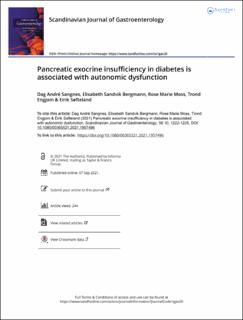Pancreatic exocrine insufficiency in diabetes is associated with autonomic dysfunction
Sangnes, Dag André; Bergmann, Elisabeth Sandvik; Moss, Rose Marie; Engjom, Trond; Søfteland, Eirik Wigtil
Journal article, Peer reviewed
Published version

Åpne
Permanent lenke
https://hdl.handle.net/11250/2831540Utgivelsesdato
2021Metadata
Vis full innførselSamlinger
- Department of Clinical Medicine [2066]
- Registrations from Cristin [9791]
Originalversjon
Scandinavian Journal of Gastroenterology. 2021, 56 (10), 1222-1238. 10.1080/00365521.2021.1957496Sammendrag
Objectives: Pancreatic exocrine insufficiency (PEI) is prevalent in diabetes. Pathophysiological theories imply autoimmune destruction, lack of trophic effects of insulin or impaired neuronal stimulation, but the relationship between PEI and autonomic dysfunction is largely unknown. In a pilot study, we aimed to investigate if patients with diabetes and PEI had impaired autonomic function.
Methods: We measured faecal elastase in 59 patients with type 1 or 2 diabetes, using a cut-off-value <200 μg/g to define PEI. Based on faecal elastase results, patients were stratified into matched case (n = 8) and control groups (n = 13). We used heart rate variability, baroreflex sensitivity and orthostatic hypotension tests to assess autonomic dysfunction.
Results: All baroreflex sensitivity parameters were reduced in cases with PEI compared with controls (all p < .05). The heart rate variability parameters root mean square of successive RR interval differences (p = .05) and high frequency (p = .04) were also reduced. We found no difference in orthostatic hypotension between the groups.
Conclusions: In this first-of-its-kind study, we found that diabetes patients with PEI had reduced autonomic function compared with matched controls. Although numbers are small, results support the hypothesis that autonomic dysfunction could be a contributor to PEI in diabetes.
